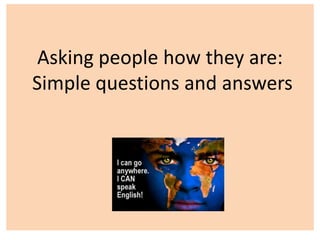
Lesson 19 asking how they are
- 1. Asking people how they are: Simple questions and answers
- 2. Different ways to ask 1. How are you? How are you doing? How is it going? ¿Cómo estás? ¿Cómo te va? ¿Qué tal te va? 2. I’m fine, thank you Very well, thank you Estoy bien, gracias Muy bien, gracias 3. I’m OK - I’m alright So, so I’m not OK Estoy bien Más o menos No estoy bien 4. Thanks for asking! How about you? ¡ Gracias por preguntar ! ¿Qué tal tú? 5. I’m fine, too También estoy bien
- 3. Oral practice: Read and repeat Good morning (Buenos días) Hey, how are you? (Hey, ¿cómo estás?) I’m fine, thank you. How about you? (Bien, gracias. ¿Y qué tal tú?) I’m fine, too. (Bien, también) Great! How is your family? ( ¡Genial! ¿cómo está tu familia? ) They are OK, thanks for asking (Están bien, gracias por preguntar) Fantastic! Well, my friend, see you soon. ( ¡Fantástico! Bueno, amigo, nos vemos pronto ) See you, take care! ( ¡Nos vemos, cuídate! ) Bye! ( ¡Chao! )
